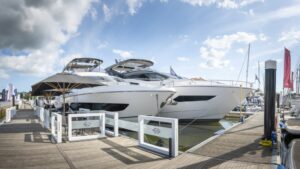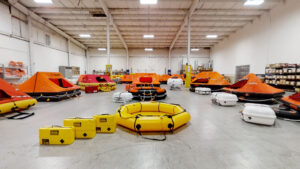Cape Town: How South Africa’s superyacht credentials are changing
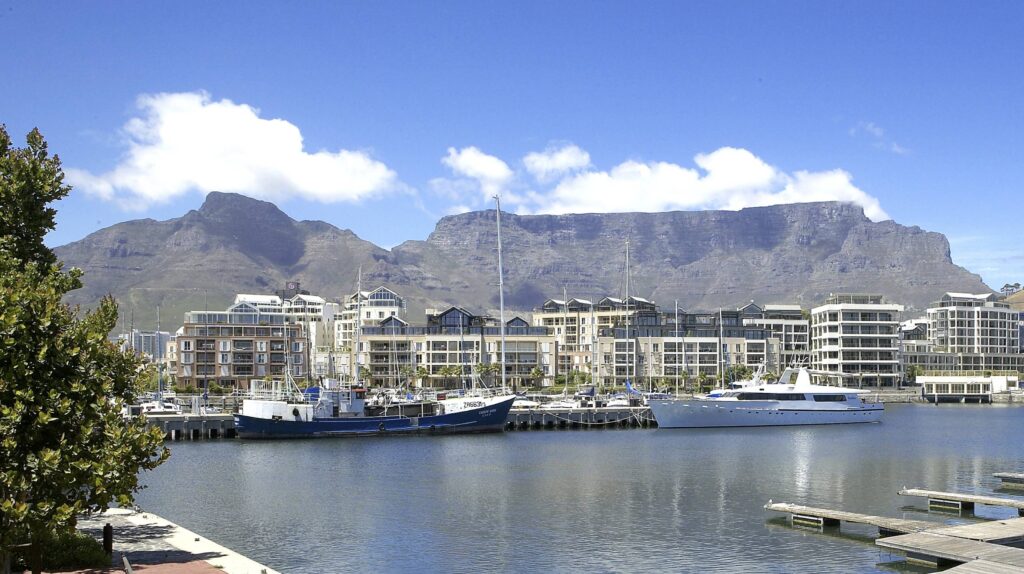 Photo courtesy of V&A Waterfront
Photo courtesy of V&A Waterfront
Following piracy in the Red Sea, can South Africa provide a safe haven and new superyacht hub for visiting vessels? Superyacht Cape Town founding member Veda Pretorius talks new ventures…
South Africa has a proven track record in the international boating industry. It has had dominant success in the catamaran sector, has a strong reputation in the RIB and working boat industry, and is now turning its sights on the superyacht sector. The local marine industry is mobilising and working to solidify South Africa’s position in the leisure marine arena, focused on attracting superyachts and nurturing its most significant export, superyacht crew.
Cape Town boatbuilding industry
Local government and industry stakeholders in Cape Town have united to position it as a budding superyacht destination. Cape Town has been welcoming yachts for many years, but is now increasingly and proactively working on developing the potential of Cape Town as a superyacht hub.
The strength of a superyacht hub depends on several critical factors, including – but not limited to – a robust local industry providing essential services, marinas, cruising grounds and a legislative framework that makes it easy and a pleasure for yachts to visit. It requires a diligent public-private partnership to bring all the pieces together. Cape Town now has that.
South Africa is the second largest builder of catamarans worldwide, and there is a vibrant local boatbuilding sector with all the needed ancillary services. The industry has been able to grow and develop, partly through the support of government-aligned industry associations. A prime example of this is BlueCape, which was established in 2019 to highlight opportunities within the superyacht industry to local and provincial governments.
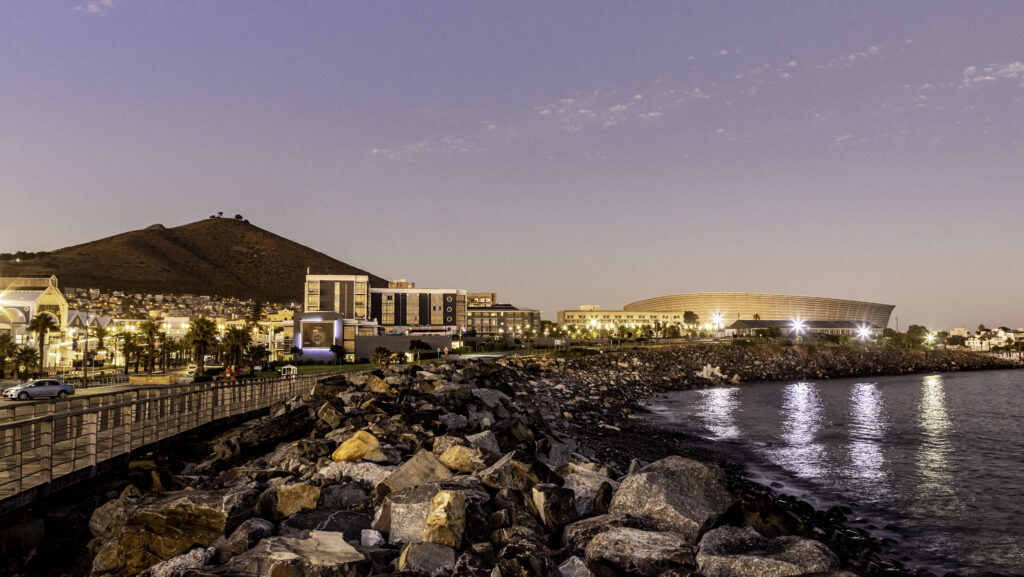
V&A Waterfront Cape Town
With its founding members, the City of Cape Town and V&A Waterfront, BlueCape champions the ocean economy, aiming to promote skills development and advocate for enhanced marine infrastructure. Its partnership with the V&A Waterfront – the developer and manager of the Cape Town Cruise Terminal – reveals synergies between cruise and superyacht sectors, spotlighting shared needs in customs, immigration etc.
“A partnership approach to attracting more superyachts to Cape Town is critical. The V&A own the water infrastructure and have operational oversight. Local South African Boat Builders Export Council (SABBEX) members provide a wealth of expertise in boat building, repairs and services. BlueCape foresees future opportunities for small and micro businesses to participate in this economic opportunity to grow the sector and enable wider sectoral participation created by more superyachts visiting and staying in our beautiful city,” says Vanessa Davidson at BlueCape.
The growth in the global superyacht fleet has made the V&A Waterfront consider additional investment in quayside infrastructure to assist and accommodate larger superyachts visiting Cape Town.
Andre Blaine, executive manager: marine and industrial at V&A Waterfront, says: “The V&A Waterfront recognises the potential and growth in the blue economy and in specific the potential that the superyacht sector will bring to the local economy, skills development and related job opportunities. It is our intention to grow our facilities at the waterfront through the development of an exclusive superyacht hub with related facilities and services. The development will come to fruition in the near future and will not only include berthing, but storage, concierge facilities, refuelling and [the] already created helicopter landing bays at our newly constructed helistop facility.”

Piracy and cargo
Recent attacks on commercial and private ships in the Gulf of Aden have increased maritime traffic from cargo ships, large fishing trawlers and cruise ships, to sailing yachts and superyachts to South Africa.
Superyacht Cape Town, a new online platform designed to attract more superyachts to the region, has taken a proactive stance, engaging directly with captains.
Superyacht Cape Town was launched in September 2023 and is working alongside BlueCape, SABBEX and the V&A Waterfront to promote the local superyacht sector by offering guidance for prospective visitors. Any apprehension largely stems from uncertainties about what awaits them. However, Superyacht Cape Town is effectively helping to dispel these doubts by providing comprehensive insights into local service providers, berthing options, and the array of facilities available.
Water, energy and crime
Superyacht Cape Town regularly receives enquiries concerning crime, safety, and visa regulations. To address these concerns, the team provides candid responses. Much like any major global city, Cape Town has areas that are best avoided. However, the regions where crew and guests spend most of their time are notably safe.
The association acknowledges the challenges regarding visa issues, particularly for crew members planning extended stays beyond three months, and the industry associations actively explore potential solutions with the Department of Home Affairs.
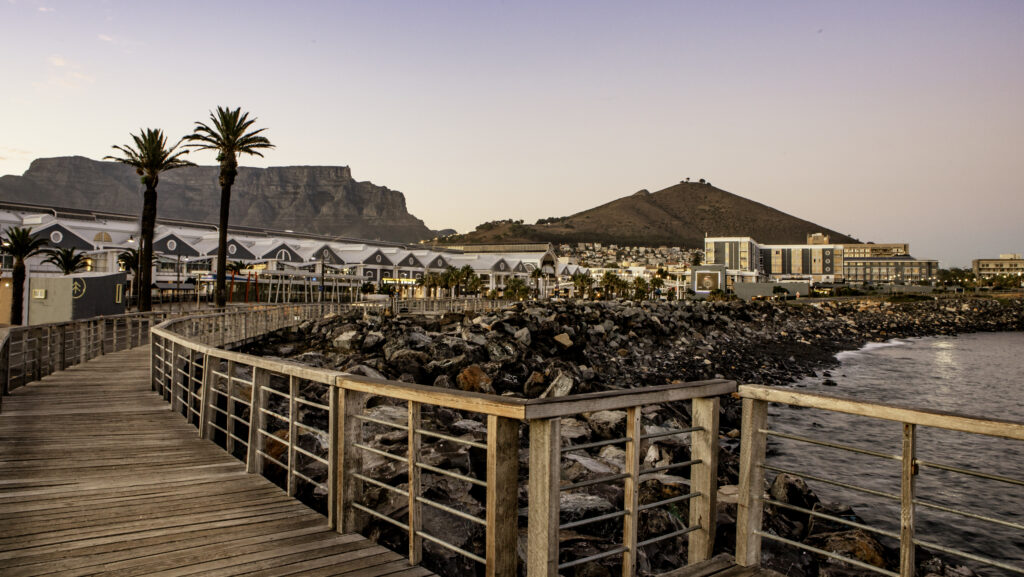
The topic of load-shedding, South Africa’s term for scheduled power outages, has raised concerns, especially given its significant impact on the hospitality sector in past years. In response, most establishments, have invested in alternative power sources. Today, you’ll find that most private homes, hotels, shopping centres, restaurants, and even residential buildings are equipped with generators, inverters, or solar panels, ensuring continuity in service and comfort.
Water supply questions often surface, particularly referencing the past drought crisis. According to Superyacht Cape Town, the story here is one of resilience. It is a commendable example, perhaps unique, of a city that not only navigated through the water scarcity challenge but also emerged with a community more conscious of water conservation.
The V&A Waterfront, where superyacht visitors will be berthed, is set to commission a desalination plant in May 2024. This facility will produce up to 5 million litres of water daily if necessary. On the energy front, the Waterfront is advancing with installing solar panels and diesel generators, ensuring that essential services remain uninterrupted and the site remains operational.
Future developments, including the superyacht berthing facilities, are designed with built-in standby power generation and The V&A Waterfront aims to achieve self-sufficiency by 2030.
Yacht crew
Significant work has also been done behind the scenes to formalise and elevate crew training. South African crew members account for around 30 per cent of superyacht crew worldwide and Superyacht Cape Town believes the sector would benefit from real consolidation.
Four of the companies offering training and job placement in South Africa are GUEST (Guidelines for Excellence in Superyacht Training) accredited, with more currently applying for the accreditation. The establishment of highly accredited training programmes in South Africa will unlock more success for the region’s credentials as a prospective superyacht hub.
Sandra Kim Jordaan from The Yacht Purser, which provides online purser training, says: “We have a unique opportunity to market South Africa as a training capital for the yachting industry because of the favourable exchange rate. Still, it should only be completed with local training providers offering training at an international level, under an accredited banner.”
Developments in the superyacht sector have also led to changes to what is required of the crew. While the core soft skills of hard work, a service attitude, diligence, and attention to detail remain, changes in vessel type and yacht ownership bring new requirements. The emergence of new energy solutions and alternative fuels will necessitate training for engineers hoping to work in the sector.
Crew rotation has also emerged as a increasingly important topic. To cater to individuals seeking a long-term career on superyachts and to enhance job longevity, the industry is adapting with new rotation policies that allow crew members to balance work and personal life, offering additional benefits for those committed to a specific yacht or programme. Additionally, a trend is developing where crew members remain loyal to a single yacht management agency, potentially transferring among various yachts in the agency’s fleet to foster career growth and demonstrate dedication.
The superyacht industry in South Africa stands poised for growth, supported by local developments and a well-trained workforce. However, geopolitical tensions and changing technology underscore the need for continued adaptation and innovation within the sector.
All images courtesy of V&A Waterfront.


